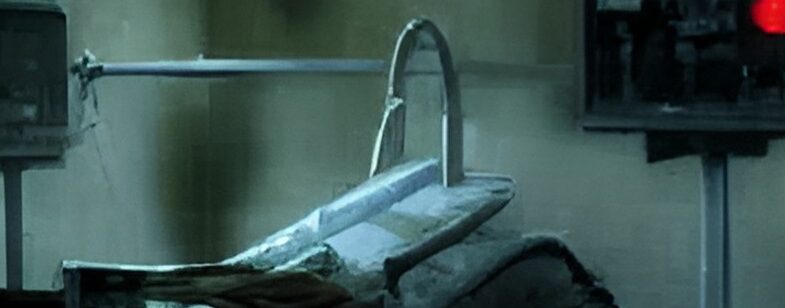He slept by her side most nights. The quiet whir of machinery once kept him awake, but that had long since faded into a white noise that Thomas couldn’t sleep without whenever he had to find another place to stay.
From a regulatory standpoint, Thomas wasn’t even supposed to be able to sleep by her side. The space Jardine slept in was part of a ward, each bed separated from the others by translucent curtains, thin enough that activity on the other side became shadow play.
Although what she did could hardly be called sleep anymore. From around their sliver of allocated space often came the sounds of weeping, moaning, and struggle. These noises often woke her. Mind already heavy with treatment and painkillers, she would often fly into a confused state. He had seen how the nursing staff handled other patients who had been so possessed and it made him glad that he was here to help calm her.
There was no television in the ward, and bringing in outside devices might risk contamination, so he spent much of his time watching the slow drip of one of the IVs. He was watching one bag produce its secretion into the tube that connected it to Jardine when he heard her voice, calm for the first time in a long time. “Thomas?”
He smiled, struggling out of his chair to take her hand. “I’m here.”
“Where are we?”
“In the hospital.” When out on the empty streets, Thomas had sometimes seen broadcasts of treatment centers, converted stadiums and arenas where the less fortunate were sequestered. Knowing Jardine was here in an actual, if crowded, hospital was one of the few things that gave him hope.
In response, as she often did, she moved her head around on the threadbare pillow, swiveling to take in the curtains that surrounded her like so many grey-garbed prison guards. But Thomas knew her eyes were weak, as was her breathing, so came the disoriented question, “How long have we been here?”
“Since the beginning.” It had been many months since the epidemic had swept the nation, but he didn’t see a reason to mention that.
Even as confused as she might be, Jardine was still a sharp one. She reached for him, nearly placing fingers on the plastic face-shield of the protective equipment that swaddled him from head to toe. “How can we afford this?”
“The insurance is covering it,” he lied. His employer had once supplied health insurance but had long since folded, taking its coverage with it into whatever bankrupt space failed businesses disappear. One more victim of the epidemic.
Jardine almost managed the cluck she would often make when she didn’t believe him, her eyes conveying as much. “And the deductible?”
“We’re paying it out of our savings,” he lied again. The privilege of actual hospital care had long since drained the funds they had spent a lifetime accumulating.
Jardine found the strength to actually reach him then, putting a hand on the shell that separated her hand from his cheek. “Oh, Thomas, they can’t cure this.”
Thomas smiled wanly, and only hoped that his wife’s impaired vision kept her from seeing the tears blurring his own. “That’s what they said about cancer. We beat that, didn’t we?”
Thomas could see Jardine was already sinking back under the surface of drugs and oxygen deprivation. As she continued her attempts at protest, he wondered if he would need to put the breathing mask back on her. He was saved from this decision by an orderly, astronaut-like in his own protective gear, pushing through the cloud of curtains.
“Mr. Aberdeen, your shift starts soon.”
Thomas glanced between the orderly and Jardine, grateful to see she had drifted off and he wouldn’t have to explain what this meant. Instead he only nodded to the orderly, then muttered an affirmation when he remembered simple human gestures often couldn’t penetrate through the layers of protective gear. He rose and followed the other man, who led him to the service elevator. Feeling gravity pull on them as they descended, neither said anything.
The racket of generators greeted them as the elevator doors opened and they stepped out into the dark of the subbasement. With so much power needed elsewhere, the lights of the utility halls were rarely lit, only the orange glow of the furnaces illuminating their destination.
At the end of the dark hall, the pair entered the boiler room, the clatter of the generators replaced with the roar of the incinerator. The muttering of the priest, barely a silhouette in his black biosuit, could hardly be heard over it, his ministrations lost to the bellows.
The orderly ignored him and gestured to the bodybags, stacked on shelves next to the furnace. “There’s already a dozen here and I’ve been told to expect at least 50 today. You’d better get to work.”
Thomas didn’t think it was possible to feel more weary, but he held himself up as he stared at the polyethylene bags. “Oh goodie,” he managed, hoping to elicit some comradely belly-aching from the orderly.
Instead, the other man, face-shield reflecting the Halloween glow of the incinerator, said, “Mr. Aberdeen, your wife has been allowed to stay here on condition of you completing the tasks assigned to you.”
There was something in the orderly’s tone that provoked Thomas’ already considerable irritability. “They’re corpses, son – just say it. Most people are too afraid of infection to touch them and you need someone to move the ones left behind.”
Whatever the tilt of the orderly’s helmet meant was lost behind his mask. His reply, though, softened some. “There aren’t many able-bodied people willing to do this work anymore.” As if remembering the company line, he added, “Which is why, without insurance or government assistance –”
“That Jardine is provided treatment here. I know.” Thomas also knew that if Jardine had the expected life span of most epidemic victims, the contract he had signed with the hospital would keep him doing this long after she was gone. “Why don’t you get out of here and let me get to work?”
The orderly left without further words, and with no help from the priest but his prayers for the dead, Thomas set to work. The epidemic wasted most people to almost nothing before the end, so moving the bodybags to the gurney and shuttling them into the incinerator wasn’t particularly hard physical labor.
He tried not to think about how Jardine would one day be in a bag like these. Thomas could only hope that he didn’t have to be the one to take her into the incinerator. If he was, perhaps he’d strip off the plastic shell of his protective gear and embrace her one last time. That would certainly end the contract.
See the author’s published work here.
Related Posts
The American: The Trouble with Idiots (pt. 3) Next Post:
The American: The Trouble with Idiots (pt. 4)
























